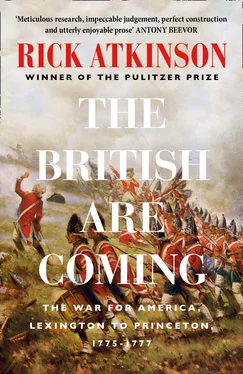Not a man believed him, least of all Washington. “Good God!” John Adams wrote upon hearing the news. “What shall we say of human nature?” The infamous letter, Adams conceded, “is the oddest thing imaginable. There are so many lies in it, calculated to give the enemy a high idea of our power and importance.… Don’t let us abandon him for a traitor without certain evidence.” But what should be done? British statutes dating to the fourteenth century clearly defined treasonous offenses, including “imagining the death of our lord the king,” mounting a rebellion, or seducing the queen. Yet the articles of war recently adopted in Philadelphia failed to address espionage or treason. Uncertain about how best to proceed, Congress sacked Church as surgeon general on October 14 and instructed Massachusetts to decide his fate.
At ten a.m. on Friday, October 27, Church was bundled into a chaise by the county sheriff and escorted by twenty soldiers with fife and drum three miles to the Watertown meetinghouse. Members of the Massachusetts House of Representatives, of which Church was an elected delegate, filled many of the hundred boxes on the ground floor. Spectators packed an upstairs gallery, and armed guards stood at each exit. Summoned by the doorkeeper, Church strode down the aisle to a wooden bar below the pulpit. The Speaker, James Warren, read a dispatch from Washington describing the war council’s conclusion that Church was guilty of “holding a criminal correspondence with the enemy.” The infamous letter was produced, and the decryption read.
For more than an hour, Church parried the accusations, invoking the Magna Carta, habeas corpus, and his pure heart. He claimed that he had refused a guinea a day to betray the American cause and that he had merely intended to confuse, if not dupe, the British. The letter was “innocently intended, however indiscreetly executed,” just a “piece of artifice,” ultimately intended for his brother-in-law, a loyalist newspaper publisher. And how, he asked, could he have conducted a criminal correspondence if the letter had not reached the British? General Greene, watching from the gallery, wrote his wife that night, “With art and ingenuity … he veiled the villainy of his conduct and by implication transformed vice into virtue.” Church “appeared spotless as an angel of light,” William Tudor, the judge advocate general, told John Adams.
The assembly broke for a late lunch. After a chicken wing and a mug of flip at Coolidge’s Tavern, Church resumed his defense at three-thirty p.m. “Is it criminal, sir, to alarm them with a parade of our strength and preparation?” he asked. “If this is the work of an enemy, where are we to look for a friend?” Invoking his long service to the cause, he added, “Weigh the labors of an active life against the indiscretion of an hour.… To your wisdom, gentlemen, to your justice, to your tenderness, I cheerfully submit my fate.”
That fate was sealed. The House promptly expelled him for what James Warren called “the wickedness of his heart.” Under orders from Congress, Washington sent him with a nine-man prisoner escort to Connecticut, where Church complained of being confined in a “close, dark, and noisome cell”; Congress specifically denied him “the use of pen, ink, and paper.” Not for more than 150 years, after scholars sifted through General Gage’s private papers, would Church’s guilt be irrefutably confirmed: he had been a British spy at least since early 1775, for cash, and had likely provided information about hidden weapons in Concord, among other rebel secrets.
During Church’s lifetime, he was briefly paroled after several physicians reported that asthmatic conditions in the Connecticut dungeon endangered his health. But angry rioters sacked his Boston house and forced him back to jail for his own protection; efforts to exchange him for American prisoners held by the British provoked more riots. His wife and children made their way to London, where the king gave her a £150 pension. In 1778, Church would finally be allowed to go into exile, but the sloop carrying him to Martinique vanished without a trace. He was never heard from again, although his grieving father, a Boston deacon, refused to give up hope to his own dying day. In 1780, he bequeathed £5 and a shelf of books to his son Benjamin, “whether living or dead, God only knows.”
All through the fall, bored, mischievous, and gullible American soldiers spread fantastic rumors: that the British had been ordered back to England, that a French fleet had put to sea on America’s behalf, that the Spanish had besieged Gibraltar, that eight German generals—or three German princes—would soon arrive with an ammunition ship to help Washington, that Holland had called in debts and forced Britain to declare bankruptcy. It was said on the best authority that a London mob had destroyed the Parliament building and chased Lord North to France.
Autumn sickness crept through the camps, and although the American force exceeded 20,000 by early November, those present and fit for duty remained below 14,000. The officer corps now comprised 60 colonels and lieutenant colonels, 30 majors, 290 captains, 558 lieutenants, and 65 ensigns. Washington’s host also included 21 chaplains, 31 surgeons, 1,238 sergeants, and 690 drummers and fifers. All games of chance, including pitch and hustle, which involved a halfpence coin, were forbidden by his order, so to build morale, wrestling matches were staged in late October between the brigades on Winter and Prospect Hills. Men foraged for chestnuts, apples, and turnips; they sang camp songs accompanied by German flutes. Weather forecasters studied the “upper side of the moon” for clues, though no one doubted that winter was coming. The army would need ten thousand cords of firewood in the next few months, and Washington was already fretting over “a most mortifying scarcity” that hindered recruiting and could force his regiments to disperse or risk freezing.
Every day British fire drubbed the bivouacs, sometimes forty or fifty cannonballs for each American shot. “At about 9 a.m. we flung two 18-lb. balls into Boston from the lower fort, just to let them know where to find us, for which the enemy returned 90 shots,” a soldier told his diary in October. A comrade wrote of the same incident, “One man had his arm shot off there and two cows killed. Nothing new.” Local newspapers carried dozens of reward offers for deserters, including “one Jonathan Hantley, a well-set fellow, about five feet nine inches in height … talks with a brogue, pretends to doctor, professes to have great skill in curing cancers”; and Simeon Smith, “about 5 feet 4 inches high, had on a blue coat and black vest … his voice in the hermaphrodite fashion”; and “Matthias Smith, a small smart fellow, is apt to say, ‘I swear, I swear!’ and between his words will spit smart.”
For more than twenty years Washington had doubted that amateur citizen soldiers could form what he called “a respectable army,” capable of defeating trained, disciplined professionals. Nothing he had seen in Cambridge changed his mind. Militiamen called to arms for a few weeks or months “will never answer your expectations,” he had once written. “No dependence is to be placed upon them. They are obstinate and perverse.” With most enlistments due to expire in December and January, Washington told Hancock on October 30 that perhaps half of all the junior officers were likely to leave the army and “I fear will communicate the infection” to the enlisted ranks. “I confess,” he added, “I have great anxieties upon the subject.”
All the more reason to strike the British before winter arrived and his army drifted away. Yet his wish for “a speedy finish of the dispute” found little support among his generals. A proposed amphibious assault on Boston, supported by artillery and a frontal attack at the Neck, was unanimously rejected by his war council for fear that Boston would share Charlestown’s charred fate. Washington suggested another plan and it, too, was rejected, to a man, on October 18. “Too great a risk,” General Lee advised. “Not practicable under all circumstances,” General Greene added.
Читать дальше












